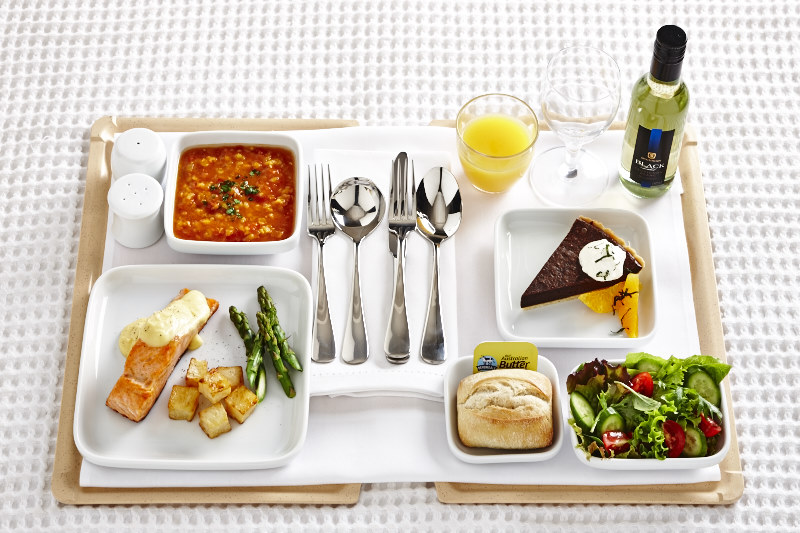In healthcare, nutrition extends beyond fueling our bodies. It’s a key element in promoting wound healing, elevating mental wellbeing, and accelerating the recovery process. Whether it’s pressure ulcers, post-surgery wounds, postpartum recovery, or burns, good nutrition plays a vital role in nurturing both the body and the mind and supporting a person’s recovery. That’s why having good quality catering for both in-patients and out-patients at a hospital is so important.
Beyond sustenance: the psychological aspect of food
Food is more than just nourishment, particularly in the context of hospital stays. Hospital environments can be stressful and alien, making the comfort and familiarity of appetising meals immensely valuable. According to Queensland Health’s Nutrition and Wound Healing, “Without good nutrition, wound healing may be impaired or wounds may take longer to heal”.¹ And that goes for more than just wounds. Adequate nutrition is crucial to supporting the growth and repair of body tissues essential for healing.
Nutrition and Wound Healing continues to explain that for best nutrition, it’s important to choose a variety of foods from all five food groups—vegetables and legumes, grains, fruits, proteins, and dairy. The act of consuming well-prepared and enjoyable meals with such variety during recovery can also evoke positive emotions, ease stress, and restore a sense of normalcy during times of physical vulnerability.

The role of nutrients in mental health
Hospital stays can be confronting and negatively affect mental wellbeing. Providing poor foods for in-patients can be a big part of this. As such, it’s important that the food served during a patients’ stay is good quality, tasty food that provides nourishment and supports mental wellness. Queensland Health emphasises that a diet “rich in antioxidants, healthy fats, and various vitamins and minerals supports brain function, aiding stress and mood management”.
Our in-house dietitians expand on this in their nutrition fact sheet, Nutrition Care Tips On Healing Wounds, explaining that the key vitamins and minerals for enhancing cognitive function and mood include omega-3 fatty acids, B and C vitamins, zinc, and iron. These come in foods such as orange, capsicum, fish, dark green leafy vegetables, and seeds.
A gourmet path to recovery: insights from our in-house dietitians’ factsheet
At Cater Care, our commitment extends beyond culinary expertise, embracing the unique dietary needs of patients to create an experience that supports psychological, emotional, and physical wellbeing for optimal recovery. Our in-house dietitians advocate for protein-rich, high-energy foods to enhance healing and positive mental wellbeing, as highlighted in their fact sheet, Nutrition Care Tips On Healing Wounds. This emphasises the importance of protein for tissue maintenance and repair, recommending incorporation of protein sources in every meal.
This approach aligns with Queensland Health’s Nutrition and Wound Healing, which also suggests incorporating fluids that provide energy and protein into your diet, including milk and juice, and mixing “high energy/high protein foods into other foods”, including cream, cheese, and avocado.
Cultivating a positive relationship with food
Patients’ relationships with food can evolve significantly during hospitalisation. Quality catering can mitigate common challenges such as appetite loss, ensuring that each meal is a step toward healing, both physically and mentally.
According to Queensland Health, strategies like “eating more often if you can’t eat a lot” and “mixing high-energy and high-protein foods into other foods” can enhance the dining experience and encourage patients to view meals as sources of healing and comfort.

Why choose contract catering for hospitals?
Amidst the complexities of healthcare, professional contract catering proves its worth. Hospitals must focus on providing exceptional medical care, while catering experts, like Cater Care, take charge of providing nourishing and appetising meals. This division of roles ensures patients receive the best of both worlds—good healthcare and good food.
We have a commitment to fresh, high-quality food, every time. Hospital meals, often criticised for taste and quality, need not be subpar. By partnering with catering specialists, hospitals can deliver meals that not only meet nutritional needs but also bring joy to patients.
Culinary harmony for recovery: nourishing both body and soul
The relationship between nutrition, mental health, and healing is undeniable. By prioritising nutrient-rich, well-presented meals, healthcare facilities can foster an environment of healing that encompasses both body and mind. At Cater Care, we’re proud to play a role in revolutionising the patient experience through exceptional catering. The recommendations and emphasis on essential nutrients from our in-house dietitians’ fact sheet further underscore our commitment to holistic patient wellbeing. For a patient, each bite can be a step towards healing.
Client Development Manager
Reference: Nutrition Education Materials Online, Queensland Health. Nutrition and Wound Healing – Metro North Hospital and Health Service, 2017. https://www.health.qld.gov.au/__data/assets/pdf_file/0034/363994/hphe_wound.pdf. Accessed 28 August 2023.